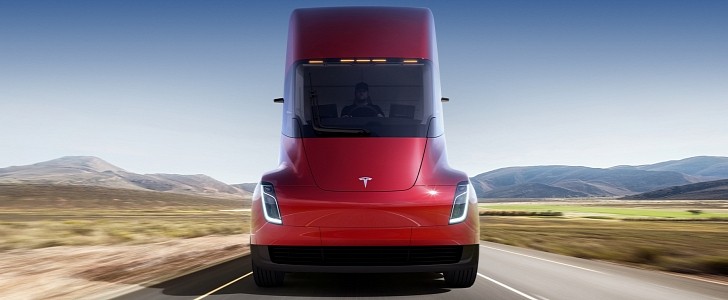PepsiCo’s chairman and CEO said that his company would get its first set of Tesla Semis in Q4 2021. What Ramon Laguarta told CNBC is that Tesla will manufacture and deliver a vehicle that the EV maker said is still under development in its Q3 2021 earnings report. In a way, that resembles Tesla’s deal with Hertz for selling the rental company 100,000 EVs.
PepsiCo allegedly signed a contract with Tesla to buy 100 units of the Semi in 2017. When Reuters wrote about it on December 12, 2017, Tesla refused to comment. The information came from Mike O’Connell, senior director of the North American supply chain for PepsiCo subsidiary Frito-Lay at the time. The executive is now Pepsico's VP for Supply Chain: Service & Distribution.
That means Tesla never confirmed having a contract with PepsiCo. We would not be surprised if Elon Musk tweeted that no agreement has been signed, just like he did with Hertz recently. Until Tesla officially confirms the deal, all we have is PepsiCo’s word on it.
To make matters worse, Hertz has an advantage over PepsiCo: it bought products that actually exist and are available to any customers, such as the Model 3. PepsiCo claims it will receive a vehicle that is still under development and lacks a crucial part to be completed: 4680 cells.
Musk already said they will only be ready by April 2022 in the best-case scenario or by October 2022 in the worst. The automotive journalist Lei Xing recently revealed that – according to his sources – 4680 cell production would happen only beyond 2022. In other words, all products that depend on it will only be manufactured by 2023 or later unless Tesla comes with another solution for them.
That may be possible for the Cybertruck and Roadster, but it is implausible with the Semi. The massive battery pack these trucks will require imposes the new battery format. The need to charge faster than other EVs to cut downtime to a minimum also requires more robust technology than that lithium-ion cells used nowadays offer.
A great chemistry candidate for the Semi in terms of charging speed and reliability would be LFP if it did not have a low energy density. With these cells, the truck would be even heavier than if it used NMC batteries. The heavier the Semi is, the less cargo it can carry.
That all said, somebody did not get their facts straight when Laguarta said PepsiCo will receive its trucks now. If that actually happens, Cybertruck customers will start to ask why the electric pickup truck has been delayed. If it doesn’t, as most pieces of evidence point to be the case, Laguarta will go after the ones that made him go through this public embarrassment, whether at Tesla or in his own company. Grab your popcorn.
That means Tesla never confirmed having a contract with PepsiCo. We would not be surprised if Elon Musk tweeted that no agreement has been signed, just like he did with Hertz recently. Until Tesla officially confirms the deal, all we have is PepsiCo’s word on it.
To make matters worse, Hertz has an advantage over PepsiCo: it bought products that actually exist and are available to any customers, such as the Model 3. PepsiCo claims it will receive a vehicle that is still under development and lacks a crucial part to be completed: 4680 cells.
Musk already said they will only be ready by April 2022 in the best-case scenario or by October 2022 in the worst. The automotive journalist Lei Xing recently revealed that – according to his sources – 4680 cell production would happen only beyond 2022. In other words, all products that depend on it will only be manufactured by 2023 or later unless Tesla comes with another solution for them.
That may be possible for the Cybertruck and Roadster, but it is implausible with the Semi. The massive battery pack these trucks will require imposes the new battery format. The need to charge faster than other EVs to cut downtime to a minimum also requires more robust technology than that lithium-ion cells used nowadays offer.
A great chemistry candidate for the Semi in terms of charging speed and reliability would be LFP if it did not have a low energy density. With these cells, the truck would be even heavier than if it used NMC batteries. The heavier the Semi is, the less cargo it can carry.
That all said, somebody did not get their facts straight when Laguarta said PepsiCo will receive its trucks now. If that actually happens, Cybertruck customers will start to ask why the electric pickup truck has been delayed. If it doesn’t, as most pieces of evidence point to be the case, Laguarta will go after the ones that made him go through this public embarrassment, whether at Tesla or in his own company. Grab your popcorn.









